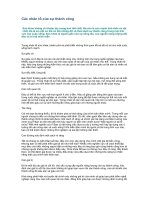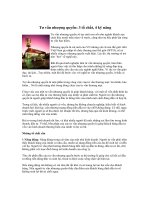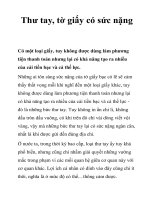Back Door to WarThe Roosevelt Foreign Policy1933-1941 pdf
Bạn đang xem bản rút gọn của tài liệu. Xem và tải ngay bản đầy đủ của tài liệu tại đây (33.89 MB, 712 trang )
Back Door to War
The Roosevelt Foreign Policy
1933-1941Back Door to War
The
Roosevelt Foreign Policy
1933-1941
by
CHARLES CALLAN TANSILL
Professor of
American Diplomatic History
Georgetown University
GREENWOOD PRESS, PUBLISHERS
WESTPORT, CONNECTICUT
Library of Congress Cataloging in Publication Data
Tansill,
Charles Callan, 1890-
Back door
to
war.
Reprint
of a
1971 issue of the 1st ed. published
in
1952 by Regnery, Chicago,
Bibliography:
p.
Includes index.
1. United States—Foreign relations—1933-1945.
2.
World politics—1933-1945.
3.
World War, 1939-
1945—Causes.
I.
Title.
C
E8O6.T3
1975
3
327.73 75-1121
ISBN
0-8371-7990-4
Copyright 1952 CHARLES CALLAN TANSILL
All rights reserved, including the right to reproduce this
book or portions thereof in any form.
Originally published in 1952 by Henry Regnery Company,
Chicago
Reprinted with the permission of Henry Regnery Company
Reprinted in 1975 by Greenwood Press,
a division of Williamhouse-Regency Inc.
Library of Congress Catalog Card Number 75-1121
ISBN 0-8371-7990-4
Printed in the United States of America
TO
MY STUDENTS OF
MORE THAN THREE DECADES
T
HE armistice of November n, 1918, put an end to World
War I, but it ushered in a battle of the books that continues to
the present day. Responsibility for the outbreak of that con-
flict was glibly placed by Allied historians upon the shoulders of the
statesmen of the Central powers. German historians replied with a
flood of books and pamphlets that filled the shelves of many libraries,
and the so-called "revisionists" in many lands swelled this rising tide
by adding monographs that challenged the Allied war-guilt thesis.
While this historical argument was still being vehemently waged,
World War II broke out in 1939 and academic attention was shifted
to the question of the responsibility for this latest expression of mar-
tial madness.
There was little doubt in most American minds that Hitler had de-
liberately provoked World War II by his attack upon Poland. Since
1933 he had been caustically criticized in the American press. His
unrestrained manner of speech, his dubious program for the regenera-
tion of Germany, and the mad antics of some of his fanatical followers
had created in numerous American circles a personal hatred of him
that far exceeded the strong antipathy felt for Kaiser Wilhelm during
the first decade of the twentieth century. There is no doubt that, as
far as America was concerned, Hitler was a liability that all the good
intentions and the best brains of Germany could never liquidate. The
immediate blight that he inflicted upon German-American relations can
be readily appreciated when we contrast the friendly press notices of the
Bruning government with the sharp attacks made upon the Nazi politi-
cal groups after February 1933.
Each item in the Hitler program of expansion evoked columns of
recriminations in many American newspapers. Distrust of Germany
went so deep and spread so far that every vestige of American good
will vanished from the pages of periodicals that once had been friendly.
Streams of refugees of different races and different creeds gave detailed
testimony of widespread injustice and the denial of the freedoms that
seemed so essential to the American way of life.
From 1933 to 1939 multitudes of Americans were being slowly con-
ditioned for war along some foreign frontier. As Hitler rearmed Ger-
Vlll PREFACE
many and prepared to put force behind his bold announcements, large
numbers of persons in this hemisphere began to feel that his bid for
power was a menace to them as well as to his European neighbors. The
old followers of Woodrow Wilson had never renounced their alle-
giance to a one-world ideal, and they were fervent in their belief that
America should take an active part in the preservation of world peace.
They received strong support from many "liberals" and "intellectuals"
who believed that modern science had banished the old barriers of
time and space and had brought the peoples of the world into such
close communion that some form of world government was an inter-
national imperative.
Some scholars like Charles A. Beard have pointed out that presi-
dential pronouncements from 1933 to 1937 gave scant encouragement
to ardent one-worlders, but they underestimated the importance of the
Chief Executive's conversion to the explosive nonrecognition doctrine
so strenuously advocated by Henry L. Stimson. This was a bomb whose
long fuse sputtered dangerously for several years and finally burst into
the flame of World War II. It was entirely fitting that Stimson became
Secretary of War in 1940; no one deserved that title quite as well as
he.
The entry in his Diary for November 25, 1941, is illuminating.
With regard to Japan "the question is how we should maneuver them
into the position of firing the first shot without allowing too much
danger to ourselves." On the following day Secretary Hull answered
this question by submitting an ultimatum that he knew Japan could
not accept. The Japanese attack upon Pearl Harbor fulfilled the fondest
hopes of the Roosevelt Cabinet. It was easy now to denounce Japanese
perfidy and to exult in the fact that the shock of the tragedy had erased
all divisions of opinion in America. It was several years before inquir-
ing minds began seriously to question the background of Pearl Har-
bor. When the report of the Army Pearl Harbor Board boldly pointed
out the questionable conduct of General George C. Marshall, the
Chief of
Staff,
Secretary Stimson rushed to his defense. On the con-
venient ground of ill-health he later refused to appear before the
Joint Congressional Committee that investigated the tragedy of Pearl
Harbor.
In preparing this record of American foreign policy during the pre-
war years I have been fortunate in securing access to the copious cor-
respondence in the confidential files of the Department of State. Up
to this time no other historian has fully utilized the same materials. I
wish to express my appreciation of the helpful courtesies shown me by
Dr. C. Bernard Noble, chief of the Division of Historical Policy Re-
PREFACE IX
search in the Department of State, and his able assistants, Mr. Richard
Humphrey and Dr. Taylor Parks.
In the Library of Congress I have immensely profited by the tradi-
tional helpful courtesy now personified by Dr. Luther Evans. I wish
also to record my indebtedness to Mr. Verner W. Clapp, chief assist-
ant librarian, Mr. David C. Mearns, chief of the Division of Manu-
scripts, Mr. Archibald B. Evans, Dr. Charles P. Powell, Dr. Elizabeth
McPherson, Mr. John de Porry, Miss Katherine Brand, and Mr. David
Cole.
In the National Archives I am indebted for assistance to the National
Archivist, Mr. Wayne Grover, Dr. Philip Hamer, and Dr. Carl Lokke.
I wish to record a particular debt of gratitude to Mrs. Kieran Carroll
whose ability and gracious spirit have made the National Archives a
most pleasant place in which to work. I wish also to mention Dr. Almon
Wright, Mrs. Natalia Summers, and Mrs. William A. Dowling whose
beauty and charm make it a little difficult to keep one's mind upon ar-
chival research.
In Georgetown University my colleague, Dr. Tibor Kerekes, has as-
sisted me in innumerable ways, while the librarian, Mr. Phillips Tem-
ple,
has bent every effort to secure the documentary data on which some
of my chapters have been based.
To my old friend, Dr. Harry Elmer Barnes, I am deeply indebted
for inspiration and assistance in every stage of the preparation of my
manuscript.
There are many personal friends who have been of great assist-
ance:
ex-Senator Burton K. Wheeler, Judge Bennett Champ Clark, Dr.
Walter A. Foote, Captain Miles DuVal, Rev. Henry F. Wolfe, Dr.
Louis M. Sears, Dr. Reinhard H. Luthin, Dr. Rocco Paone, Dr. Carmelo
Bernardo, Colonel Joseph Rockis, Dr. John Farrell, Dr. Eugene Bacon,
Mr. Edwin H. Stokes, Mr. Anthony Kubek, Mr. Louis Carroll, Miss
Mary Ann Sharkey, Miss Susan Sharkey, Mr. William R. Tansill, Mr.
Charles B. Tansill, Mr. Raymond T. Parker, Mrs. B. R. Parker, Miss
Grace Lee Tansill, Mrs. Mary Ann Sharkey, Mrs. C. Bernard Purcell,
Mr. Fred G. Tansill, Mrs. Grace M. Carpenter, Miss Hazell Harris,
Miss Amy Holland, and Rev. Herbert Clancy, S.J.
I cannot forget the inspiration of my dear friend, Dr. Gerald G.
Walsh, S.J., whose wide scholarship has often kept my feet on the path
of objectivity.
I have dedicated this volume to my students of more than three dec-
ades.
They have been a strong bridge that has carried me over many
deep waters of discouragement.
X PREFACE
Last, and most of all, I wish to thank my wife, Helen C. Tansill,
who has walked with me along all the paths of research, interpretation,
composition, and bookmaking which could have been inexpressibly
dreary without the proper companionship.
CHARLES CALLAN TANSILL
Georgetown University
TABLE OF CONTENTS
Page
PREFACE vii
HISTORICAL INTRODUCTION 3
a. The Rise of Anglo-American Friendship 3
b.
Japan Is Given a Green Light to Expand in Manchuria 3
c. Sir Edward Grey Scores a Diplomatic Success 6
d. The Department of State Strikes a False Note 7
e. The Allies Violate the Pre-Armistice Contract 10
f. Reparations and Rascality 11
g. The Colonial Question 14
h. The Problem of Poland: Danzig—The Polish Corridor—
Upper Silesia 16
i. The Occupation of the Rhineland 21
j.
The Starvation Blockade 22
k. German Reaction to the Treaty of Versailles 24
I. AMERICAN RELATIONS WITH THE WEIMAR REPUBLIC 25
a. America Rejects Trials of War Criminals 25
b.
The Allies Balk at the Payment of American Army
of Occupation 26
c. France Moves into the Ruhr 27
d. President Hoover Suggests a Moratorium on Reparations 30
e. Chancellor Briining Is Compelled to Resign 33
f. The Disarmament Problem Remains a Challenge 35
g. American Press Opinion of Hitler in 1933 39
h. American Diplomats Regard Germany with Misgivings 40
i. President Roosevelt "Torpedoes" the World
Economic Conference 42
j.
The Four Power Pact Proves a Failure 44
k. William E. Dodd Goes to Germany as U.S. Ambassador 45
1.
The President Tells a Spurious Story 46
II. THE FAR EAST IN FERMENT 51
a. A Triple Offensive Is Launched against Japan 51
b.
Sun Yat-sen Gives the Chinese Revolution a Red Tinge 58
Xll
TABLE
OF
CONTENTS
Page
c. Senator Borah Attacks Foreign Imperialism in China 62
d. Causes of the Antiforeign Movement in China 64
e. The Kuomintang Demands Tariff Autonomy 65
f. American Missionaries Help to Mold United States Policy 66
g. Evolution of U.S. Policy towards Nationalist China 67
h. The Kuomintang Armies Employ Red Advisers 69
i. Peking and Canton Demand Revision of Existing Treaties 70
j.
Britain Challenges American Leadership in China 72
k. Congress Supports a Policy of Treaty Revision 73
1.
The Nanking Incident and Its Repercussions 75
m. Secretary Kellogg Is Indifferent to Red Menace in China 77
III. CONTINUED
FRICTION
WITH
JAPAN
POINTS
TOWARDS
INEVITABLE WAR 80
a. Congress Enacts an Exclusion Law Which Angers Japan 80
b.
Japan Invites United States Capital to Invest in Manchuria 82
c. Chinese Soldiers Provoke the Tsinan Incident 85
d. Russia Teaches the War Lord of Manchuria a Lesson 87
e. Background of the Manchurian Incident 90
f. Secretary Stimson Prepares a Path to War 97
IV. SECRETARY
STIMSON
PRODUCES A PATTERN OF WAR 104
a. American Press Opinion of the Stimson Doctrine 104
b.
Stimson Helps to Push Japan out of the League 109
c. Matsuoka Marches out of the League 116
d. President Roosevelt Regards with a Friendly Eye the
Principle of Collective Security 119
V. SECRETARY
HULL
SPURNS A
JAPANESE
OLIVE
BRANCH
123
a. America Makes a Friendly Bow to League of Nations 123
b.
Japan Earmarks Jehol as a Part of Manchukuo 124
c. Secretary Hull Rejects Idea of Japanese Good-Will Mission 127
d. Friction in Far East Points to Eventual Russo-Japanese War 128
e. Japanese Gestures of Friendship Are Rebuffed by the U.S. 130
f. Japan Proclaims a Monroe Doctrine for the Far East 133
g. The State Department Frowns upon an Understanding
with Japan 139
h. Closing the Open Door in Manchuria
?
140
TABLE OF CONTENTS xiii
Page
VI.
Moscow
MOLDS
THE
POLITICAL
PATTERN
IN
THE FAR
EAST
144
a. Secretary Hull Overlooks a Diplomatic Opportunity 144
b.
Japan Denounces the Washington Naval Treaty 144
c. Japan Promotes Autonomy Movement in North China 147
d. America and Britain Protest against Japanese Policy 149
e. American Purchases of Silver Adversely Affect China 149
f. Japan Again Asks for Naval Parity 150
g. President Roosevelt Delivers a Lecture to Wicked Dictators 151
h. Chinese Nationalism Makes a Common Cause
with Communism 153
i. Japan Draws Closer to Germany 156
j.
Japan Seeks an Accommodation with China 157
k. Chiang Kai-shek Welcomes Communist Help against Japan 160
1.
Japan Tries to Conciliate China 161
m. Soviet Russia Promotes a War between China and Japan 164
VII.
MUSSOLINI LOOKS UPON ETHIOPIA
WITH ACQUISITIVE EYES
165
a. Britain Recognizes Italian Aspirations in Northeast Africa 165
b.
Italy Deserts the Triple Alliance 166
c. Britain Moves to Conciliate Mussolini 167
d. Italy's Alleged Need for Colonial Outlets 168
e. The Walwal Incident Points in the Direction of War 169
f. Secretary Stimson Enjoys Friendly Relations with Mussolini 172
g. General Johnson Creates Tension in Italian-American
Relations 175
h. Beginnings of the Rome-Berlin Axis 176
i. Anthony Eden Whispers a Few Confidences
to Hugh Wilson 176
j.
The Walwal Arbitration Encounters a Delay 177
k. Mussolini Rejects a Proposal of Anthony Eden 178
1.
The Emperor of Ethiopia Seeks American Intervention 179
m. Italy Is Anxious to Assume the White Man's
Burden in Africa 181
n. President Roosevelt Urges Mussolini to Accept Arbitration 183
0 The White House Denounces Dollar Diplomacy 184
VIII.
BRITAIN
AND
FRANCE
FEAR
TO
PROVOKE
WAR
OVER
THE
ISSUE
OF
ETHIOPIA
187
a. France Vainly Seeks Promises of Aid from Britain 187
XIV TABLE OF CONTENTS
Page
b.
The
Walwal Arbitral Commission Dodges
the
Issue
188
c. Laval Wishes
to
Conciliate Mussolini
188
d.
Secretary Hull Rejects
the
Role
of
Mediator
191
e. Britain
and
France Seek
to
Solve
the
Ethiopian Problem
191
f.
Ambassador Long Favors Giving Mussolini
a Slice
of
Ethiopia
193
g. Laval Makes
a Bow
towards Britain
194
h. Britain Wishes
the
U.S.
to
Accept Important
Responsibilities
195
i. Anthony Eden Expresses Suspicions
of
Russia
196
j.
Ambassador Long Advises against Sanctions
198
k. Secretary Hull Defines
the
Position
of the
United States
199
1.
The
Committee
of
Five Makes
a
Futile Suggestion
199
m. The Department
of
State Ponders
the
Problem
of
Sanctions
200
n. Italy Rejects
the
Proposal
of the
Committee
of
Five
202
0. Mussolini Offers
a
Formula
of
Peace
204
p.
Britain Bids
for
American Support
205
q.
Mussolini Moves
in the
Direction
of War 207
r.
Secretary Hull Offers "Moral Support"
to
Ethiopia
208
s.
Britain Engages
in a Bit of
Diplomatic Double Talk
209
IX.
AMERICA ANTICIPATES
THE
LEAGUE
IN
EXERTING
ECONOMIC
PRESSURE
UPON
ITALY
211
a.
Senator
Nye
Flusters Foreign Diplomats
211
b.
The
Offensive against American Neutrality
214
c.
The
President Accepts
a
Congressional Program
of Neutrality
219
d.
American Reaction
to the
Italo-Ethiopian
War 221
e.
The
League Names Italy
as an
Aggressor Nation
224
f.
Secretary Hull Insists upon
an
Independent Policy
227
g. Britain Limits Italian Freedom
of
Speech
230
h. America Refuses
to
Follow
a
Parallel Policy with Britain
231
1.
Italy Hopes
to
Preserve American Friendship
234
j.
The
Department
of
State Exerts Pressure upon Italy
236
X.
MUSSOLINI MAKES
A
MOCKERY
OUT OF
COLLECTIVE
SECURITY
238
a.
Secretary Hull Defends American Policy
238
b.
The
Hoare-Laval Agreement
241
c. President Roosevelt Chides Italy
244
TABLE
OF
CONTENTS
XV
Page
d. Josef Beck Loses Confidence in the League 247
e. Implications of the Maffey Report 248
f. Britain Wishes Oil to Be on List of Sanctions 250
g. Mussolini Makes a Peaceful Gesture 251
h. Britain Becomes More Friendly with Hitler 252
i. The League Attempts to End the Italo-Ethiopian War 254
j.
Britain Continues to Court Hitler 255
k. America Refuses to Adopt a Realistic Policy 257
1.
Eden Recommends that Sanctions Be Lifted 258
m. The Principle of Nonrecognition Is Invoked by the
United States 261
XL AMBASSADOR
DODD
FINDS
BERLIN AN UNPLEASANT
SPOT
FOR A WILSONIAN DEMOCRAT 264
a. Nazi Germany Makes a Friendly Gesture
towards America 264
b.
Dodd Declines to Attend the Niirnberg Party Congress 266
c. American Citizens Are Roughly Handled
by Storm Troopers 267
d. Professor Coar Tries to Improve German-American
Relations 268
e. George Sylvester Viereck Offers to Assist the President 269
f. Mr. Kaltenborn Receives a Lesson in Incivility 272
g. Germany Withdraws from the League of Nations 273
h. The Debt Problem Embarrasses German-American
Relations 277
i. New York City Stages a Mock Trial of Hitler 280
j.
The Nazi Regime Is Placed upon an Uneasy Defensive 284
XII. AMERICA VIEWS THE HITLER REGIME
WITH
INCREASING
DISLIKE 290
a. Similarities between Nazi and American Fiscal Policies 290
b.
General Johnson Denounces the Nazi Party Purge 291
c. The Assassination of Chancellor Dollfuss 293
d. The Death of President Hindenburg 294
e. American Opinion of the Saar Plebiscite 295
f. The Anglo-French Declaration Looks towards
Collective Security 296
g. Hitler Breaks Another Link in the Chain of Versailles 298
h. Apparent Agreement at Stresa 299
XVI TABLE OF CONTENTS
Page
i. France Makes
an
Important Agreement with Russia
300
j.
Britain
and
Germany Negotiate
a
Naval Treaty
301
k. Secretary Hull
Is
Fearful
of the
Role
of
Moral Leadership
302
1.
The
Bremen Incident
303
m. American Hostility towards
the
Hitler Regime
305
XIII.
EUROPE
FAILS
TO
FIND
A
SUBSTITUTE
FOR
LOCARNO
307
a.
Hitler Liquidates
the
Locarno Pact
307
b.
American Press Opinion Relative
to the
Rhineland
310
c. Europe Views
the
Hitler Coup with Alarm
310
d.
Hitler Offers
a New
Formula
for
Peace
314
e. Eden Turns with Each
New
Diplomatic Breeze
315
f.
Hitler
and
Mussolini Reach
an
Important Accord
318
g. Versailles Undergoes Another Attack
319
h. Germany
and
Italy Recognize Franco
320
i.
The
German-Japanese Anti-Comintern Pact,
November
25, 1936 320
j.
Europe Tries
to
Replace Locarno
321
k. Hitler's Soft Answers Stir
New
Hope
in
Europe
324
1.
France
Is
Hopeful
of
American Support
325
XIV. THE
SHADOW
OF
DICTATORSHIP BEGINS
TO
DARKEN
THE
AMERICAN LANDSCAPE
327
a.
European Statesmen Fumble
for a
Peace Formula
327
b.
Belgium Breaks
Her
Bonds with Britain
and
France
329
c. Mayor
La
Guardia Hurls
a
Verbal Bomb
at
Hitler
332
d.
Secretary Hull Regrets
the
Action
of La
Guardia
333
e. Cardinal Mundelein Creates Tension between
the
Vatican
and
Germany
334
f. The
American Press
Is
Critical
of the
Bombardment
of Almeria
338
g. Points
of
Friction along
the
Economic Front
339
h.
The
Department
of
State Authorizes Attendance
at
Nazi Parteitag
340
i. Secretary Hull
Is
Critical
of
Ambassador Dodd
341
j.
The
President Advocates
a
Quarantine
of
Aggressors
342
k. American Opinion
of the
Quarantine Speech
344
1.
The
Nazi Regime
Is
Placed upon
an
Uneasy Defensive
347
m. Mussolini Pays
a
Momentous Visit
to
Berlin
348
TABLE
OF
CONTENTS
Page
XV.
BRITAIN BLOCKS
AN
EFFORT
OF
ROOSEVELT
TO
FIND
A
PATH
TO
PEACE
350
a.
Secretary Ickes Widens
the
Breach between
the
United States
and
Germany
350
b.
Hitler Repudiates
the
German-American Bund
354
c. Austrian Independence Hangs
in the
Balance
359
d.
Ambassador Bullitt
Has
Some Important Conversations
360
e. Hitler Plays Host
to
Lord Halifax
362
f.
Britain Blocks
a
Presidential Program
for
Peace
368
XVI.
HITLER TAKES
OVER
AUSTRIA
AS
A
LONG-DELAYED
STEP
TOWARDS
Anschluss 371
a. The
Viennese Waltz Takes
on
Macabre Overtones
371
b.
Schuschnigg Pays
a
Visit
to
Berchtesgaden
375
c. Lord Halifax Learns
the
Price
of
Appeasement
377
d.
British Appeasement
of
Italy
Is Too
Little
and Too
Late
380
e. Hitler Marches into Vienna
382
f.
American Reaction
to
Anschluss
383
XVII.
PRESIDENT BENES POSTPONES
TOO
LONG
A
POLICY
OF
APPEASEMENT
389
a.
Czechoslovakia Precipitates
the
May Crisis
389
b.
The
Sudeten Germans Formulate Demands Which They
Know Cannot
Be
Fulfilled
391
C. Chamberlain Says Britain Will
Not
Fight
for Czechoslovakia
393
d.
Tension
in
Czechoslovakia
394
e. Germany Prepares
a
List
of
Political Imperatives
397
f.
Konrad Henlein Asks
for
Provocative Concessions
399
g. Lord Runciman Calls Czechoslovakia
an
"Accursed Land"
400
h.
Sir
Nevile Henderson Loses Patience with BeneS
404
i. Kennedy Predicts
U.S.
Intervention
in
World
War II
406
j.
Chamberlain Decides
to
Visit Berchtesgaden
407
k. British Appeasement Saves Hitler
408
XVIII.
MUNICH:
PRELUDE
TO
PRAGUE
410
a.
President Roosevelt Extends Monroe Doctrine
410
b.
Chamberlain Pays a Visit
to
Berchtesgaden
411
c. BeneS Accepts
the
Anglo-French Proposals
414
XV111
TABLE OF CONTENTS
Page
d. Hitler Formulates New Demands 415
e. Chamberlain Makes a New Appeal to Hitler 418
f. Roosevelt Supports Chamberlain's Plea for Peace 421
g. Britain Makes Further Efforts to Preserve Peace 422
h. Roosevelt Exerts Further Pressure upon the Dictators 424
i. Chamberlain Prepares the Basis for the Munich Accord 425
j.
Capitulation at Munich 427
k. American Opinion of Munich 428
1.
Diplomatic Straws in the Wind 430
XIX. HITLER TAKES CZECHOSLOVAKIA UNDER
PROTECTIVE CUSTODY 433
a. International Aspects of Anti-Semitism in Germany 433
b.
Ambassador Kennedy Toys with the Idea of Acting as an
Interlocutor between Hitler and Roosevelt 436
c. Ambassador Wilson Is Recalled from Germany 436
d. Dr. Schacht Offers Solution of Refugee Problem 438
e. Secretary Ickes Increases Tension in German-American
Relations 440
f. The Economic Offensive against Germany Is Accelerated 441
g. Germany Is Anxious for an Accord with the United States 442
h. Chamberlain Pays Ardent Court to Mussolini 444
i. France Favors a Free Hand to Hitler in Eastern Europe 446
j.
The British Foreign Office Has a Case of Jitters 447
k. Germany Fears the
U.S.
Will Intervene in World War II 450
1.
Hitler Takes the Czechs under Protective Custody 452
m. Reaction in the U.S. to German Absorption
of Czechoslovakia 455
XX. RUSSIA INSTIGATES WAR IN THE FAR EAST;
ROOSEVELT BLAMES JAPAN 456
a. Communist Instigation of War in the Far East 456
b.
Secretary Hull Makes a Statement on
U.S.
Policy 458
c. The Situation in North China Becomes Ominous 462
d. The Department of State Insists upon an
Independent Policy 463
e. The Scene Shifts to Shanghai 468
f. China Appeals to the League 471
g. President Roosevelt Proposes a Quarantine 475
TABLE
OF
CONTENTS
XIX
Page
XXI.
JAPAN PROPOSES
A
JOINT SEARCH
FOR
WORLD PEACE
BUT HULL DECLINES
4
SI
a.
Germany Views with Evident Dissatisfaction
the
Outbreak
of War between China
and
Japan
481
b.
The
Abortive Brussels Conference, November 3-24,1937
485
c.
The
Panay Incident
488
d. The
Mission
of
Admiral Ingersoll
to
London
490
e. Japan Establishes
a
Series
of
Puppet Governments
in
China
492
f.
The Far
East after Munich
494
g. Chiang Kai-shek Suggests Another Washington
Conference
496
h.
The
Economic Ties That Failed
to
Bind Japan Closely
to
the
United States
497
i. Secretary Hull Rejects
a
British Suggestion
for
Exerting
Economic Pressure upon Japan
500
j.
China Anticipates
War in
Europe
and
Asks Britain
and
France
to
Consult with
Her
with Regard
to
a
Common Front against Japan
504
k. Japan Asks Secretary Hull
for a
Joint Japanese-American
Effort
to
Find Some Formula
of
Peace
for
Europe
505
XXII.
EUROPE MOVES TOWARDS
WAR
509
a.
Chamberlain Makes
a
Momentous Pledge
to
Poland
509
b.
Lord Halifax Tries
to
"Work Something
Out"
with
the
Duce
514
c. Mussolini Moves into Albania
515
d.
American Reaction
to the
Seizure
of
Albania
516
e.
The
Dictators' Reply
to the
President's Criticism
520
f.
The
Role
of
Russia Becomes Increasingly Important
521
g. Pope Pius
XII
Makes a Plea
for
Peace
523
XXIII.
STALIN LIGHTS
THE
FUSE
TO
WORLD
WAR
II 525
a.
Britain
Is
Reluctant
to
Regard Russia
as an
Ally
525
b.
Chamberlain Begins
to
Pursue
the
Russian Phantom
532
c. Germany Seeks
an
Accord with Russia
532
d.
Britain
and
France Make
New
Overtures
to
Russia
533
e. Germany Signs
an
Important Treaty with Russia
537
f.
The
Duce Tries
to
Sit
on a
Slippery Diplomatic Fence
540
g. Chamberlain Expands
His
Pledges
to
Poland
541
h. Hitler Sends
a
Warning
to
France
543
XX TABLE
OF
CONTENTS
Page
i.
The
Fiihrer Turns Once More
to
Britain
544
j.
Zero Hour
in
Europe
547
k. Roosevelt Makes
an
Appeal
for
Civilian Populations
551
1.
Last-Minute Attempts
at
Mediation
551
XXIV.
ROOSEVELT ADOPTS
A
MORE POSITIVE
POLICY
TOWARDS THE
WAR IN
EUROPE
558
a. The
President Promises Peace
for
the
U.S.
558
b.
The
Mission
of
William Rhodes Davis
to
Berlin
558
c.
The
Barriers Preserving Neutrality Are Broken Down
561
d. A
Safety Belt
for the
Western Hemisphere
566
e. Secretary Hull Engages
in a
Battle
of
the
Books
567
f.
Hitler Adopts
a
Conciliatory Policy towards
the
U.S.
570
g. Finland Goes Down Fighting Soviet Aggression
571
h.
The
Mission
of
Sumner Welles
574
i. Britain
and
Germany Flout the Neutrality
of
Norway
580
j.
Greenland
Is
Placed under
the
Monroe Doctrine
583
XXV.
ROOSEVELT SEEKS
A
PRETEXT
FOR WAR
WITH
GERMANY
584
a.
Hitler Launches a Blitzkrieg along the Western Front
584
b.
Roosevelt Regards Neutrality
as an
Outmoded Concept
586
c.
The
President Makes
a
Third Plea
to
Mussolini
to Stay
Out
of
the
War
590
d.
Reynaud Makes
a
Last Appeal
to
Roosevelt
for
Immediate Military Assistance
591
e.
The
Destroyer Deal
595
f.
Propaganda Pushes America towards Intervention
599
g. Lend-Lease—Back Door to Intervention
in
World
War II
602
h. Hitler Is Anxious to Avoid Conflict with the United States
606
XXVI.
JAPAN
IS
MANEUVERED
INTO
FIRING
THE
FIRST
SHOT
AT
PEARL
HARBOR
616
a.
Japanese Bombings
of
Chungking
616
b.
The
Tientsin Affair
617
c. Chiang Kai-shek Asks that Roosevelt Mediate
in
Sino-Japanese War
618
d. The
President's Attitude towards Japan Becomes
Increasingly Belligerent
619
e. Japan Establishes
a
New
Central Government
in
China
621
TABLE OF CONTENTS xxi
Page
f. Japan Compels Both Britain and France to Adopt
a Policy of Appeasement 622
g. The President Orders a Cautious Economic Offensive
against Japan 623
h. Japan Concludes an Alliance with the Rome-Berlin Axis 625
i. America Draws Closer to Britain 627
j.
Matsuoka and Prince Konoye Are Willing to Sacrifice
Japan's Position in China for the Cause of Peace 628
k. An Informal Negotiation Looking towards an Improvement
in Japanese-American Relations 629
1.
Blueprint for Anglo-American Co-operation 630
m. Japan Seeks Peace, Not War, with the United States 630
n. Admiral Nomura Strives to Improve Japanese-American
Relations 632
o. Matsuoka Advises a Policy of Delay 633
p.
Secretary Hull and Ambassador Nomura Search in Vain
for a Formula of Peace 633
q. Matsuoka Is Dropped but Roosevelt Grows
More Belligerent 635
r. The Atlantic Conference Pushes America Closer to a
Break with Japan 639
s. Roosevelt Refuses to Meet Prince Konoye 640
t. General Marshall and Admiral Stark Oppose
an Ultimatum to Japan 642
u. Japan Is Maneuvered into Firing the First Shot
at Pearl Harbor 645
BIBLIOGRAPHY
653
INDEX
669
a. The Rise of Anglo-American Friendship
THE MAIN OBJECTIVE in American foreign policy since 1900 has been
the preservation of the British Empire. Intimate ties between Britain
and the United States were first forged in 1898 when Britain realized
that her policy of isolation had deprived her of any faithful allies upon
whom she could depend in the event of war. The guns that brought
victory to Admiral Dewey at Manila Bay sounded a new note of au-
thority in the Far East and made the British Government aware of the
fact that America could be made into a useful guardian of the life lines
of empire. With John Hay as Secretary of State it was not difficult for
the Foreign Office to arrive at an understanding with the United States
that was as intimate as it was informal.
The first Open Door note of September 6, 1899, was an exercise in
Anglo-American co-operation, with Alfred E. Hippisley giving an in-
teresting demonstration of how helpful a British official could be in
the drafting of American diplomatic notes. Theodore Roosevelt was
evidently impressed with this growing Anglo-American accord, and
when certain European powers threatened to intervene in the war Brit-
ain waged against the Boers in South Africa, he sounded a note that be-
came very familiar in the eventful years that preceded the outbreak of
World War II: "Real liberty and real progress are bound up with the
prosperity of the English-speaking peoples. I should very strongly
favor this country taking a hand if the European continent selected
this opportunity to try and smash the British Empire."
1
b.
Japan Is Given a Green Light to Expand in Manchuria
In the Far East this Anglo-American parallel policy had a definite pro-
Japanese inclination, with the Anglo-Japanese alliance of January 30,
1902,
as the cornerstone of an imposing imperialistic structure. It was
inevitable that the Department of State would favor Japan in a strug-
gle which it assumed would result in the emancipation of North China
from Russian shackles. The American press was equally pro-Japanese.
1
John H Ferguson, American Diplomacy and the Boer War (Philadelphia, 1939),
pp.
208-9.









